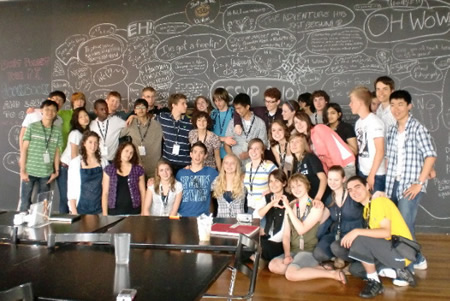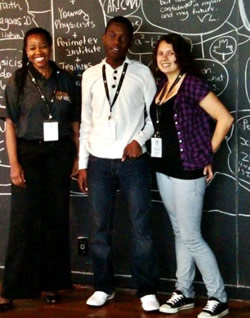| 46% of getS.E.T.go! readers think that the most important benefit of South Africa’s recent participation in the Shanghai Expo, will be the raising of our country’s science & technology profile on the global stage. | |
| 38% opted for “sharing of international best practices in maths & science education”; and 15% for “building an international network of contacts”. |
Almost 21 000 learners from around South Africa and SADC countries participated in the Science Olympiad this year.

Two South African students and a staff member of the Department of Science and Technology earned their stripes as “potential Einsteins” when they won a much sought-after place at a two-week international summer school on theoretical physics in Canada this year.
This camp, known as the International Summer School for Young Physicists (ISSYP), is a challenging two-week programme for about 40 international and Canadian high school students who have a keen interest in theoretical physics and who intend to pursue physics studies at the university level.
Held in July and August each year, it is organised by the Perimeter Institute with support from UNESCO since 2006. For the South African students and the chaperone who accompanied them, the summer school is also the culmination of much hard work: they earned their place after participating in a local Quantum Physics Camp project and submitting a written motivation and one page essay for international review.
Besides providing access to the two-week summer school in Canada, the camp project includes a local programme that is attended by around 100 students and 90 teachers. The local Quantum Physics Camp project is managed by SAASTA on behalf of the Department of Science and Technology (DST), and aims to improve the maths and physics performance of matric pupils. Its long-term goal is to increase the number of students enrolling for science, engineering and technology (SET) studies at higher education institutions.
This year, it was hosted by the Tshwane University of Technology in Pretoria in December. Students from 25 schools and their physical science teachers learnt about physics, visited industries and science councils, and received resource material on wave lengths, sound energy, career guides, and much more.
Monica Farrell, one of the South African students who attended the Canadian camp this year, described the international programme as not only teaching students about physics in the classroom, but also giving them an idea of what their life might be like as a physicist.
“There were lectures by well known physicists and mentoring groups,” she says. “The lessons were of a high standard and at the same time very interesting. It corresponded to our daily lives and what we might expect in the future.”
The programme super-charges potential "Einsteins" with:- Presentations by Perimeter Institute researchers on cutting-edge theoretical physics: hot topics such as superstring theory, quantum computing and dark matter.
- Opportunities to work with leading international theoretical physicists in small group mentoring sessions.
- Mini-courses on modern physics designed to deepen their insights into Einstein’s ideas and the quantum nature of our universe.
- Hands-on labs, tours of neighbouring research facilities, and other exciting activities with like-minded students from around the globe.
- Awareness of their own potential as potential future researchers in theoretical physics.

Seen here are the 40 students who attended the International Summer School for Young Physicists in Canada in July this year.
 |
Monica Farrell (right) with Koki Selepi of the Department of Science and Technology (chaperone) and Lefa Selepe, the three South Africans who attended this year’s International Summer School for Young Physicists. |
